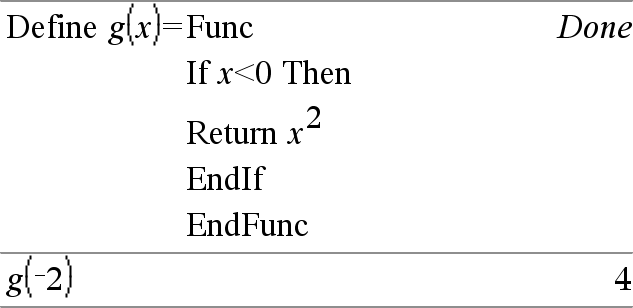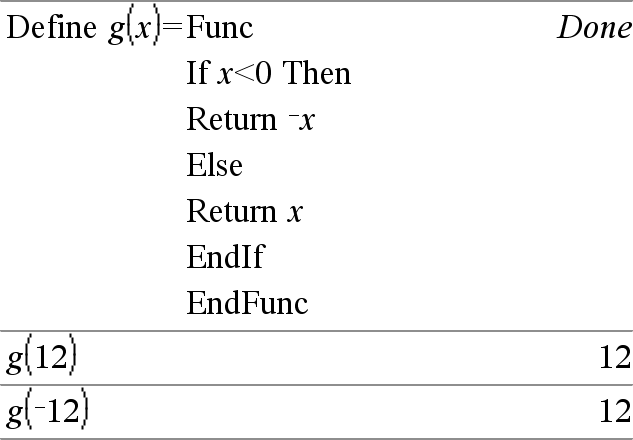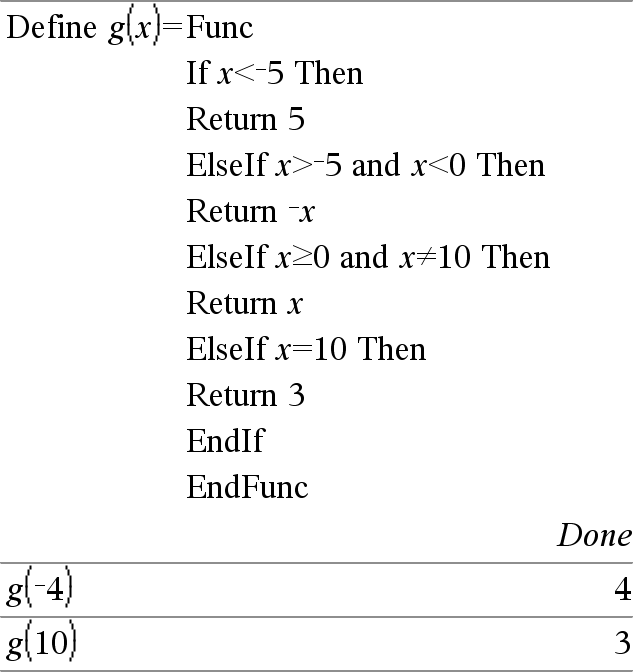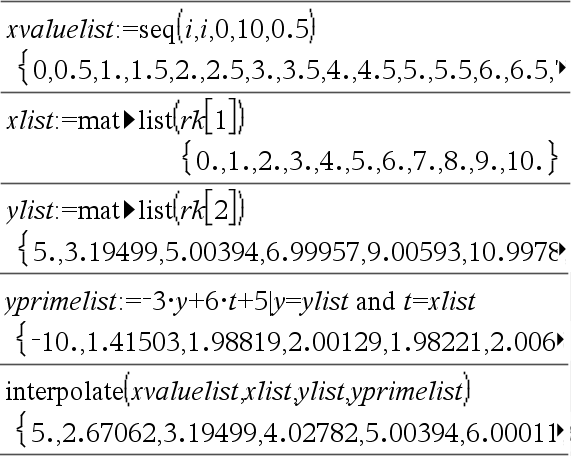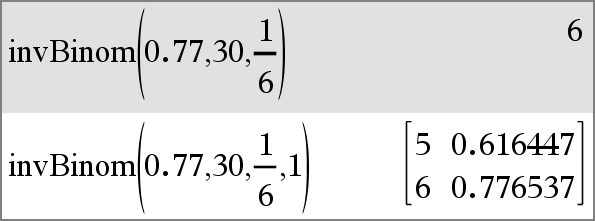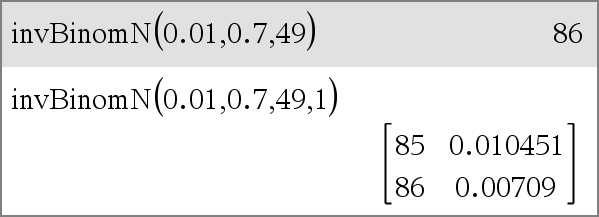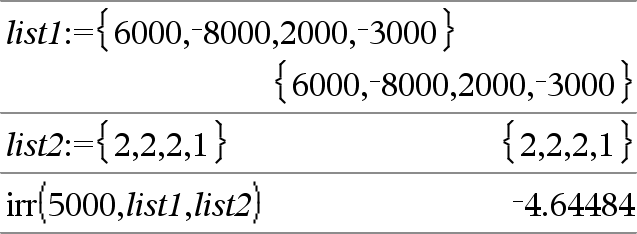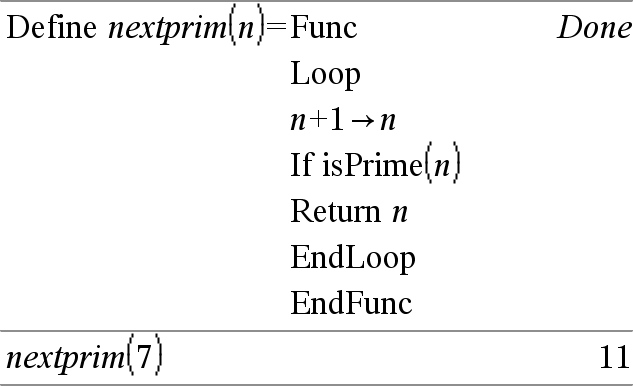|
Catalog > |
|
|
identity(Integer) ⇒ matrix Returns the identity matrix with a dimension of Integer. Integer must be a positive integer. |
|
|
Catalog > |
|
|
If BooleanExpr If BooleanExpr Then If BooleanExpr evaluates to true, executes the single statement Statement or the block of statements Block before continuing execution. If BooleanExpr evaluates to false, continues execution without executing the statement or block of statements. Block can be either a single statement or a sequence of statements separated with the “:” character. Note for entering the example: For instructions on entering multi-line program and function definitions, refer to the Calculator section of your product guidebook. |
|
|
If BooleanExpr Then If BooleanExpr evaluates to true, executes Block1 and then skips Block2. If BooleanExpr evaluates to false, skips Block1 but executes Block2. Block1 and Block2 can be a single statement. |
|
|
If BooleanExpr1 Then Allows for branching. If BooleanExpr1 evaluates to true, executes Block1. If BooleanExpr1 evaluates to false, evaluates BooleanExpr2, and so on. |
|
|
Catalog > |
||||||||||||||||
|
Evaluates the boolean expression BooleanExpr (or each element from BooleanExpr ) and produces a result based on the following rules:
Note: If the simplified BooleanExpr statement involves a list or matrix, all other list or matrix arguments must have the same dimension(s), and the result will have the same dimension(s). |
Test value of 1 is less than 2.5, so its corresponding Value_If_True element of 5 is copied to the result list.
Test value of 2 is less than 2.5, so its corresponding Value_If_True element of 6 is copied to the result list.
Value_If_true is a single value and corresponds to any selected position.
Value_If_false is not specified. Undef is used.
One element selected from Value_If_true. One element selected from Value_If_unknown. |
|
Catalog > |
|
|
imag(Value1) ⇒ value Returns the imaginary part of the argument. |
|
|
imag(List1) ⇒ list Returns a list of the imaginary parts of the elements. |
|
|
imag(Matrix1) ⇒ matrix Returns a matrix of the imaginary parts of the elements. |
|
|
Indirection |
See #(), here. |
|
|
|
|
Catalog > |
|
|
inString(srcString, subString[, Start]) ⇒ integer Returns the character position in string srcString at which the first occurrence of string subString begins. Start, if included, specifies the character position within srcString where the search begins. Default = 1 (the first character of srcString). If srcString does not contain subString or Start is > the length of srcString, returns zero. |
|
|
Catalog > |
|
|
Returns the greatest integer that is less than or equal to the argument. This function is identical to floor(). The argument can be a real or a complex number. For a list or matrix, returns the greatest integer of each of the elements. |
|
|
Catalog > |
|
|
intDiv(Number1, Number2) ⇒ integer Returns the signed integer part of (Number1 ÷ Number2). For lists and matrices, returns the signed integer part of (argument 1 ÷ argument 2) for each element pair. |
|
|
Catalog > |
|
|
This function does the following: Given xList, yList=f(xList), and yPrimeList=f'(xList) for some unknown function f, a cubic interpolant is used to approximate the function f at xValue. It is assumed that xList is a list of monotonically increasing or decreasing numbers, but this function may return a value even when it is not. This function walks through xList looking for an interval [xList[i], xList[i+1]] that contains xValue. If it finds such an interval, it returns an interpolated value for f(xValue); otherwise, it returns xList, yList, and yPrimeList must be of equal dimension ≥ 2 and contain expressions that simplify to numbers.
|
Differential equation:
To see the entire result, Use the interpolate() function to calculate the function values for the xvaluelist: |
|
Catalog > |
|
|
invχ2(Area,df) invChi2(Area,df) Computes the Inverse cumulative χ2 (chi-square) probability function specified by degree of freedom, df for a given Area under the curve. |
|
|
Catalog > |
|
|
invF(Area,dfNumer,dfDenom) invF(Area,dfNumer,dfDenom) computes the Inverse cumulative F distribution function specified by dfNumer and dfDenom for a given Area under the curve. |
|
|
Catalog > |
|
|
invBinom(CumulativeProb,NumTrials,Prob, Inverse binomial. Given the number of trials (NumTrials) and the probability of success of each trial (Prob), this function returns the minimum number of successes, k, such that the value, k, is greater than or equal to the given cumulative probability (CumulativeProb). OutputForm=0, displays result as a scalar (default). OutputForm=1, displays result as a matrix. |
Example: Mary and Kevin are playing a dice game. Mary has to guess the maximum number of times 6 shows up in 30 rolls. If the number 6 shows up that many times or less, Mary wins. Furthermore, the smaller the number that she guesses, the greater her winnings. What is the smallest number Mary can guess if she wants the probability of winning to be greater than 77%?
|
|
Catalog > |
|
|
invBinomN(CumulativeProb,Prob, Inverse binomial with respect to N. Given the probability of success of each trial (Prob), and the number of successes (NumSuccess), this function returns the minimum number of trials, N, such that the value, N, is less than or equal to the given cumulative probability (CumulativeProb). OutputForm=0, displays result as a scalar (default). OutputForm=1, displays result as a matrix. |
Example: Monique is practicing goal shots for netball. She knows from experience that her chance of making any one shot is 70%. She plans to practice until she scores 50 goals. How many shots must she attempt to ensure that the probability of making at least 50 goals is more than 0.99?
|
|
Catalog > |
|
|
invNorm(Area[,μ[,σ]]) Computes the inverse cumulative normal distribution function for a given Area under the normal distribution curve specified by μ and σ. |
|
|
Catalog > |
|
|
invt(Area,df) Computes the inverse cumulative student-t probability function specified by degree of freedom, df for a given Area under the curve. |
|
|
Catalog > |
|
|
iPart(Number) ⇒ integer Returns the integer part of the argument. For lists and matrices, returns the integer part of each element. The argument can be a real or a complex number. |
|
|
Catalog > |
|
|
irr(CF0,CFList [,CFFreq]) ⇒ value Financial function that calculates internal rate of return of an investment. CF0 is the initial cash flow at time 0; it must be a real number. CFList is a list of cash flow amounts after the initial cash flow CF0. CFFreq is an optional list in which each element specifies the frequency of occurrence for a grouped (consecutive) cash flow amount, which is the corresponding element of CFList. The default is 1; if you enter values, they must be positive integers < 10,000. Note: See also mirr(), here. |
|
|
Catalog > |
|
|
isPrime(Number) ⇒ Boolean constant expression Returns true or false to indicate if number is a whole number ≥ 2 that is evenly divisible only by itself and 1. If Number exceeds about 306 digits and has no factors ≤1021, isPrime(Number) displays an error message. Note for entering the example: For instructions on entering multi-line program and function definitions, refer to the Calculator section of your product guidebook. |
|
|
Catalog > |
|
|
isVoid(Var) ⇒ Boolean constant expression Returns true or false to indicate if the argument is a void data type. For more information on void elements, see here. |
|


